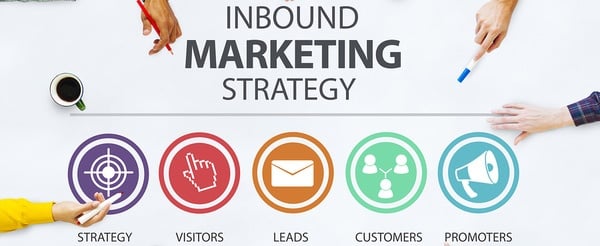The B2B Guide to Inbound Marketing
Though B2B consumers continue to indicate a preference for inbound marketing over more traditional marketing methods, some B2B companies have been...
9 min read
Mark Parent
July 2, 2014 2:28:00 PM EDT


We wanted to share these valuable statistics on Innovative Marketing Inbound tactics. While these stats are changing daily it's important to note the value proposition for each strategy and tactic.
Are you using any of these? It's likely your competition is already engaged in a number of these and mastering them. Ask yourself how can your organization leverage these.
The following stats are courtesy of Hubspot.
61% of global Internet users research products online. (Interconnected World: Shopping and Personal Finance, 2012)
44% of online shoppers begin by using a search engine. (Interconnected World: Shopping and Personal Finance, 2012)
Worldwide, we conduct 131 billion searches per month on the web. (Comscore, January 2010)
57% of TV viewers use the web simultaneously. (Nielson, 2009)
70% of the links search users click on are organic, not paid. (Marketing Sherpa, February 2007)
60% of all organic clicks go to the top three organic search results. (MarketingSherpa, February 2007)
75% of users never scroll past the first page of search results. (MarketShareHitsLink.com, October 2010)
The average click-through rate for paid search in 2010 (worldwide) was 2%. (Convario, January 2011)
Companies that blog have 97% more inbound links. (HubSpot State of Inbound Marketing Lead Generation Report, 2010)
Businesses with websites of 401-1000 pages get 6x more leads than those with 51-100 pages. (HubSpot Lead Generation Lessons from 4,000 Businesses, 2011)
Blog frequency impacts customer acquisition. 92% of companies who blogged multiple times a day acquired a customer through their blog. (HubSpot State of Inbound Marketing, 2012)
The global population of blog readers keeps growing. (eMarketer, August 2010)
81% of marketers rated their blog as useful or better. (HubSpot State of Inbound Marketing, 2012)
There are 31% more bloggers today than there were three years ago. (eMarketer, August 2010)
46% of people read blogs more than once a day. (HubSpot Science of Blogging 2010)
Most people read 5-10 blogs. (HubSpot Science of Blogging, 2010)
Nearly 40% of US companies use blogs for marketing purposes. (eMarketer, August 2010)
84% of B2B marketers use social media in some form. (Source: Aberdeen)
The majority of marketers (59%) are using social media for 6 hours or more each week. (Source: Social Media Examiner)
83% of marketers indicate that social media is important for their business. (Source: Social Media Examiner)
53% of social media marketers don't measure their success. (Source: Awareness, Inc.)
52% of marketers cite difficulties in accurately measuring ROI as their biggest source of frustration in social marketing. (Source: Adobe)
96% measure the number of fans and followers, 89% measure traffic, 84% measure mentions, 55% track share of voice, and 51% track sentiment. (Source: Awareness, Inc.)
42% of marketers say Facebook is critical or important to their business. (Source: State of Inbound Marketing, 2012)
The number of businesses that say Facebook is critical or important to their business has increased by 75%. (State of Inbound Marketing, 2012)
62% of marketers said social media became more important to marketing campaigns in the last 6 months. (State of Inbound Marketing, 2012)
Social media has a 100% higher lead-to-close rate than outbound marketing. (State of Inbound Marketing, 2012)
Companies that acquired customers from Facebook: B2C is 77% and B2B is 43%. (State of Inbound Marketing, 2012)
Retail is the top industry that has acquired customers through Facebook. (State of Inbound Marketing, 2012)
Marketers struggle with lead generation on Facebook. (Social Media Examiner)
80% of US social network users prefer to connect to brands through Facebook. (State of Inbound Marketing, 2012)
Brands have seen a 46% increase in user engagement with the new business Timeline. (Simply Measured)
Brands have seen a 65% increase in user engagement of interactive content with the new Timeline. (Simply Measured)
Ratio of views to share of Facebook comments: 9:1. (Buzzfeed)
Auto-posting to Facebook decreases likes and comments by 70%. (Digital Buzz Blog 2012)
As of April 2012, Google reports that Google+ now has 170 million active users. (Google)
Google+ attracted 20 million users within the first 3 weeks of its launch. (comScore)
As of January 2012, American users spent an average of 3.3 minutes on Google+. (eMarketer)
As of January 2012, Google+ accounted for .22% of referral traffic, falling from .24%. (Shareaholic)
Websites using the +1 button generate 3.5x the Google+ visits than sites without the button. (HubSpot)
Two of the biggest user groups on Google+ are college students and software developers. (Remcolandia)
63% of Google+ users are male. (Remcolandia)
Over 40% of marketers report that Google+ is "useful to critical" for their business. (HubSpot 2012 State of Inbound Marketing Report)
Google+ is expected to attract 400 million users by the end of 2012. (Remcolandia)
Pinterest is now the 3rd most popular social network in the U.S. in terms of traffic. (Experian)
As of February 2012, Pinterest had accumulated 10.4 million users. (AppData)
Over 80% of pins are re-pins. (RJMetrics)
Pinterest is retaining and engaging users as much as 2-3 times as efficiently as Twitter was at a similar time in their history. (RJMetrics)
Daily Pinterest users have increased by more than 145% since the beginning of 2012. (Mashable)
As of January 2012, American users spent an average of 97.8 minutes on Pinterest. (eMarketer)
Over 1/5 of Facebook-connected users are on Pinterest daily (which represents more than 2 million members). (AppData)
80% of Pinterest's users are female. (comScore)
Estimated unique visitors to Pinterest.com increased by 429 percent from September to December 2011. (Compete)
The quality of the average new Pinterest user (as defined by their level of engagement and likelihood to remain active) is high but declining. Users who have joined in recent months are 2-3 times less active during their first month than the users that came before them. (RJMetrics)
30% of Pinterest users are women 25-34 years old. (Ignite)
Pinterest users in the U.S. are more likely to live in midwestern states than your typical social networker. (comScore)
The top interests on Pinterest in the U.S. include crafts, gifts, hobbies/leisure, interior design, and fashion designers/collections. (Ragan.com)
Etsy is the top site in terms of source domains. (Source domains are the sites that content on Pinterest links to externally.) Google is second, followed by Flickr, Tumblr, and WeHeartit.com (RJMetrics)
As of January 2012, Pinterest accounted for 3.6% of referral traffic. (Shareaholic)
Total same-store referral traffic from Pinterest to five specialty apparel retailers rose 389% from July to December 2011. (Monetate)
In January 2012, Pinterest reached 11,716,000 total unique visitors. (comScore)
With over 11 million unique monthly visitors (and counting), Pinterest became the fastest standalone website to eclipse the 10 million per month mark ever. (PR Daily)
A call-to-action pin description sees an 80% increase in engagement. (Pinerly Study)
Tutorial & guide/DIY & recipe pins see a 42% higher click-through rate than other pin types. (Pinerly Study)
Pins related to trending topics see an average of 94% increase in click-throughs. (Pinerly Study)
The best time to pin during the day is between 2 and 4 PM EST. (Pinerly Study)
The best time to pin in the evening is between 8 PM and 1 AM EST. (Pinerly Study)
Shoppers referred by Pinterest are 10% more likely to make a purchase than visitors who arrive from other social networks, including Facebook and Twitter. They'll also spend 10% more on average. (Wayfair)
Pinterest referrals spend 70% more than visitors referred from non-social channels, including search, according to industry reports. (Wayfair)
In the month of March 2012, HubSpot's visitor-to-lead conversion rate for Pinterest was 15%, compared to just 9% from Google+. (HubSpot)
Call to actions promoting ebooks get almost twice the click-through rate as emails promoting webinars. (HubSpot)
Companies with 30 or more landing pages generate 7x more leads than those with fewer than 10. (HubSpot)
48% of marketers build a new landing page for each marketing campaign. (MarketingSherpa)
68% of B2B businesses use landing pages to garner a new sales lead for future conversion. (MarketingSherpa)
16% of landing pages are free of navigation bars. (MarketingSherpa)
48% of offers have multiple offers on them. (MarketingSherpa)
42% of offer-related graphics on landing pages are not clickable. (MarketingSherpa)
Businesses with 31 to 40 landing pages got 7 times more leads than those with only 1 to 5 landing pages. (HubSpot)
Those with over 40 landing pages got 12 times more leads than those with only 1 to 5 landing pages. (HubSpot)
50% of leads are qualified but not yet ready to buy. (Source: Gleanster Research)Only 25% of leads are legitimate and should advance to sales. (Source: Gleanster Research)
Jeff Ernst of Forrester Research, Inc., estimates that only about 5% of marketers use a full-featured marketing automation solution (Source: Forrester Research)
Research shows that 35-50% of sales go to the vendor that responds first. (Source: InsideSales.com)
79% of marketing leads never convert into sales. Lack of lead nurturing is the common cause of this poor performance. (Source: MarketingSherpa)
61% of B2B marketers send all leads directly to Sales; however, only 27% of those leads will be qualified. (Source: MarketingSherpa)
Just 56% of B2B organizations verify valid business leads before they are passed to Sales. (Source: MarketingSherpa)
A whopping 68% of B2B organizations have not identified their funnel. (Source: MarketingSherpa)
57% of B2B organizations identify 'converting qualified leads into paying customers as a top funnel priority. (Source: MarketingSherpa)
65% of B2B marketers have not established lead nurturing. (Source: MarketingSherpa)
79% of B2B marketers have not established lead scoring. (Source: MarketingSherpa)
34% of B2B organizations touch leads with lead nurturing on a monthly basis. (Source: MarketingSherpa)
22% of B2B organizations touch leads with lead nurturing on a weekly basis. (Source: MarketingSherpa)
15% of B2B organizations touch leads with lead nurturing on a quarterly basis. (Source: MarketingSherpa)
9% of B2B organizations touch leads with lead nurturing on a daily basis. (Source: MarketingSherpa)
2% of B2B organizations touch leads with lead nurturing on an annual basis. (Source: MarketingSherpa)
Companies that excel at lead nurturing generate 50% more sales-ready leads at 33% lower cost. (Source: Forrester Research)
Nurtured leads make 47% larger purchases than non-nurtured leads. (Source: The Annuitas Group)
Companies that automate lead management see a 10% or greater increase in revenue in 6-9 months. (Source: Gartner Research)
46% of marketers with mature lead management processes have sales teams that follow up on more than 75% of marketing-generated leads. (Source: Forrester Research)
25% of marketers who adopt mature lead management processes report that sales teams contact prospects within one day. Only 10% of marketers report the same follow-up time without mature lead management processes. (Source: Forrester Research)
Companies with mature lead generation and management practices have a 9.3% higher sales quota achievement rate. (Source: CSO Insights)
Relevant emails drive 18 times more revenue than broadcast emails. (Source: Jupiter Research)
Personalized emails improve click-through rates by 14%, and conversion rates by 10%. (Source: Aberdeen Group)
Event-triggered marketing can potentially save 80% of your direct mail budget. (Source: Gartner Research)
Lead nurturing emails get 4-10 times the response rate compared to standalone email blasts. (Source: SilverPop/DemandGen Report)
Lead nurturing emails generate an 8% CTR compared to general email sends, which generate just a 3% CTR. (Source: HubSpot)
Lead nurturing emails have a slightly higher unsubscribe rate (1%) than individual email sends (0.5%), indicating their effectiveness in removing unqualified leads from the sales funnel. (Source: HubSpot)
Companies that excel at lead nurturing have 9% more sales reps making quota. (Source: CSO Insights)
Nurtured leads produce, on average, a 20% increase in sales opportunities versus non-nurtured leads. (Source: DemandGen Report)
80.8% of users report reading email on mobile devices (HubSpot)
12% of people use separate work and personal inboxes (HubSpot)
Over 50% of respondents say they read most of their emails (HubSpot)
Secrets is the most clicked lead nurturing subject line word (HubSpot)
Posts and Jobs are the most clicked subject line words (HubSpot)
Click-through rate (CTR) is higher when using the recipient's first name in the subject line over no use of the first name (HubSpot)
CTR is higher when using the recipient's company name in the subject line over no company mention (HubSpot)
88% prefer to receive HTML emails vs. 12% who prefer plain text from companies (HubSpot)
65% prefer emails that contain mostly images vs. 35% who prefer mostly text (HubSpot)
Your most recent subscribers are the most likely to click through (HubSpot)
Saturday has the highest CTR at over 9% (Sunday is second just under 9%) (HubSpot)
6 AM has the highest CTR of any hour (HubSpot)
Most unsubscriptions come on Tuesdays (0.52% unsub rate) (HubSpot)
Clicks by button text: Click Here gets the highest % of clicks over Go and Submit (HubSpot)
The B2B marketing automation industry will reach $325 million in revenue by the end of 2011. This is a more than 50% increase over 2010, which had also doubled in revenue from the year before. (Source: Raab Associates)
The adoption of marketing automation technology is expected to increase by 50% by 2015. (Source: Sirius Decisions)
Marketing automation has seen the fastest growth of any CRM-related segment in the last 5 years. (Source: Focus Research)
By 2020, customers will manage 85% of their relationships without talking to a human. (Source: Gartner Research)
50% of respondents to a 2011 Focus survey stated they have not realized the full value of their marketing automation investment, and less than 25% use their platforms to their full potential.
50% of qualified leads are not ready to purchase immediately. (Source: Gleanster)
The average sales cycle has increased 22% over the past 5 years due to more decision-makers being involved in the buying process. (Source: Sirius Decisions)
Nearly 2/3 of B2B marketers identified engaging key decision-makers as their top challenge. (Source: Forrester Research)
47% of B2B marketers say they either close fewer than 4% of all marketing-generated leads or they don't even know this metric. (Source: Forrester Research)
89% of marketers said email was their primary channel for lead generation. (Source: Forrester Research)
With a delivery rate of just 75%, achieving strong inbox placement remains a challenge in the B2B sector. (Source: Return Path)
Only 33% of companies that use both CRM and marketing automation said the two integrated well. (Source: The Experts Bench)
64% of CMOs have either an informal or no process to manage their marketing automation. (Source: The Annuitas Group)
Companies that excel at lead nurturing generate 50% more sales-ready leads at 33% lower cost. (Source: Forrester Research)
Businesses that use marketing automation to nurture prospects experience a 451% increase in qualified leads. (Source: The Annuitas Group)
Nurtured leads make 47% larger purchases than non-nurtured leads. (Source: The Annuitas Group)
Companies that automate lead management see a 10% or greater increase in revenue in 6-9 months. (Source: Gartner Research)
46% of marketers with mature lead management processes have sales teams that follow up on more than 75% of marketing-generated leads. (Source: Forrester Research)
25% of marketers who adopt mature lead management processes report that sales teams contact prospects within one day. Only 10% of marketers report the same follow-up time without mature lead management processes. (Source: Forrester Research)
Companies with mature lead generation and management practices have a 9.3% higher sales quote achievement rate. (Source: CSO Insights)
Relevant emails drive 18 times more revenue than broadcast emails. (Source: Jupiter Research)
Personalized emails improve click-through rates by 14%, and conversion rates by 10%. (Source: Aberdeen Group)
Gartner estimates a 15% savings on creative production with marketing automation.
Gartner estimates a 5% reduction in marketing waste through automating fulfillment.
Event-triggered marketing can potentially save 80% of your direct mail budget. (Source: Gartner Research)
CMOs report they spend 8% of their marketing budgets on marketing analytics and expect to increase this level in the next three years. (Source: CMO Survey)
Spending on marketing analytics is expected to increase 60% by 2015. (Source: CMO Survey)
By 2013, lead management campaigns integrating 4 or more digital channels will outperform single- or dual-channel campaigns by 300%. (Source: Gartner)
By 2014, over 40% of large complex marketing organizations will have developed a pace-layered application approach to integrated marketing. (Source: Gartner)

Though B2B consumers continue to indicate a preference for inbound marketing over more traditional marketing methods, some B2B companies have been...

You’ve heard it said time and again – content is king – and when it comes to creating a successful agency marketing services strategy, no statement...

Are you looking to increase your marketing strategy's effectiveness? If so, you're not alone. With the vast array of marketing channels and...